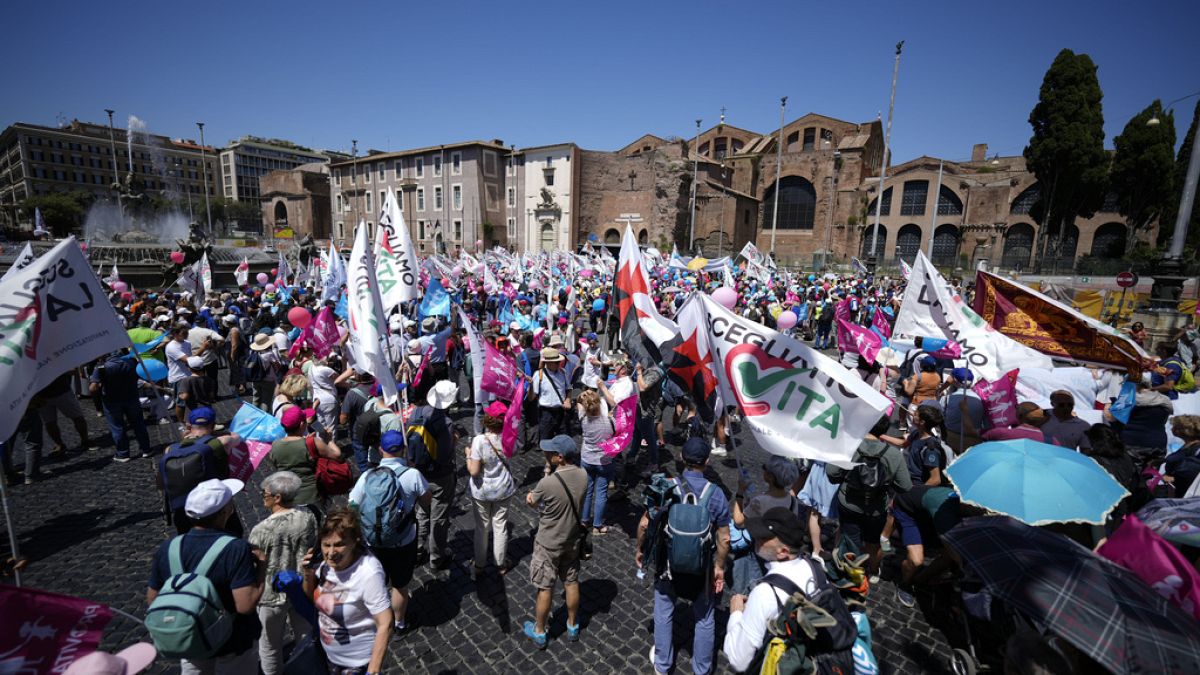Over a thousand people participated in a demonstration against abortion and euthanasia laws in Rome, organized by the ‘Pro Vita & Famiglia’ association. The association advocates for the right to life from conception to natural death and promotes traditional family values. Marco Andreoni, one of the protesters, stated that they are against law 194, which legalized abortion in Italy. Italian Prime Minister Giorgia Meloni has emphasized the importance of increasing birth rates to address the country’s demographic crisis. Italy’s fertility rate had declined to 1.2 children per woman by 2023, below the replacement rate of 2.1 children necessary for stable population growth.
Abortion has been legal in Italy since 1978, and while Meloni has expressed her commitment to upholding the law, recent legislation allows anti-abortion groups access to women seeking abortions for counseling at public health centers. This move has drawn criticism from the left-wing opposition, who view it as undermining abortion rights. The debate over abortion rights was also reflected in the recent G7 summit’s final declaration, where disagreements arose over the inclusion of language related to abortion. The final statement focused on promoting “reproductive health and rights” without specifically mentioning abortion.
The demonstration in Rome highlighted the ongoing divide in Italian society over issues related to abortion and euthanasia. While some groups, such as ‘Pro Vita & Famiglia,’ advocate for protecting the right to life and promoting traditional family values, others are concerned about potential restrictions on reproductive rights. Italian Prime Minister Giorgia Meloni’s emphasis on increasing birth rates as a solution to the country’s demographic challenges has sparked debates about the role of government in addressing these issues. The recent legislation granting anti-abortion groups access to women seeking abortions has further polarized opinions on abortion rights in Italy.
The debate over abortion in Italy is not limited to domestic politics but also extends to international forums like the G7 summit. The omission of the word “abortion” from the final declaration, despite references to “reproductive health and rights,” reflects the sensitivity of the issue and the divergent views within the global community. The inclusion of language related to reproductive health without specific mention of abortion indicates the complexity of navigating the intersection of public health, human rights, and religious beliefs on a global scale.
As Italy grapples with declining birth rates and shifting societal norms, the issue of abortion remains a contentious topic that elicits passionate responses from various segments of society. The recent demonstration in Rome and the debates at the G7 summit underscore the ongoing debates and divisions within Italian society on issues related to reproductive rights and the right to life. The tensions between those advocating for traditional values and those supporting reproductive rights reflect broader discussions about the role of government in regulating personal choices and the protection of individual freedoms. Addressing these complex issues will require a nuanced approach that balances competing interests and values in a diverse and evolving society like Italy.










